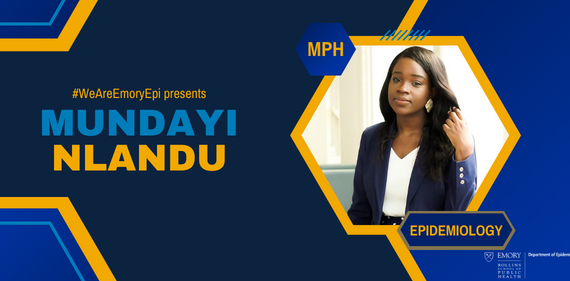#WeAreEmoryEPI: Meet Mundayi Nlandu!
Category : #WeAreEmoryEPI
Meet Mundayi Nlandu! She is a second-year MPH student interested in maternal and child health! Read more about her here!
Tell us about your academic history/where you went to school.
I received a Bachelor of Science in Biology from Xavier University in 2016. I also obtained a Graduate Certificate in Business Foundations at the University of Cincinnati in 2020.
What are your primary research interests?
My primary research interests are in maternal and child health, reproductive health, women’s health, nutrition, and chronic disease.
Are there any exciting projects you are currently working on that you’d like to share with us?
Yes! I am currently working with the Global Fortification Data Exchange (GFDx) under the supervision of Dr. Helena Pachon to produce a manuscript reviewing and analyzing updated mandatory country-food fortification legislation, standards, and monitoring documents for maize flour, oil, rice, salt, and wheat flour. The idea is that the resource (manuscript) may eventually offer some guidance for food fortification programs globally.
What is your favorite part about earning your MPH at Emory?
My favorite part about earning this degree at Emory is the passion, dedication, and rigor of the faculty, students, and the various courses. It inspires me to keep elevating as a public health professional.
When applying, what were you looking for in a public health school, and what factors drove you to pick Rollins?
Rollins was my top pick because of the location, opportunities, and alignment of research interests through the different courses provided and the faculty.
What has been your favorite class at Rollins thus far, and why?
I am currently taking EPI 516 (Issues in Women’s Health), which is eye-opening! The different speakers in each class keep it very engaging, and the students’ questions are posted at the end of each class. Overall, I think it’s interesting to see the overlap in the categories across the various topics. For example, we discussed hormones related to diet and exercise, hormonal replacement therapy, and osteoporosis.
What is one place that you’d recommend people to visit?
A cute restaurant I’d recommend is Folk Art!
What advice do you have for 1st years?
Pace yourself, have grace for yourself, enjoy the journey, and know that you will get through every semester. Also, find accountability classmates or study partners that check in with you, and vice versa, as this may help you stay motivated and focused during the more hectic weeks you’ll encounter.
What are three fun facts about you?
- I love parks.
- I enjoy watching documentaries or series based on a true story.
- I love listening to music, especially soca and afrobeats.
Thanks for talking with us, Mundayi! Tune in next week to see who we talk to next!
